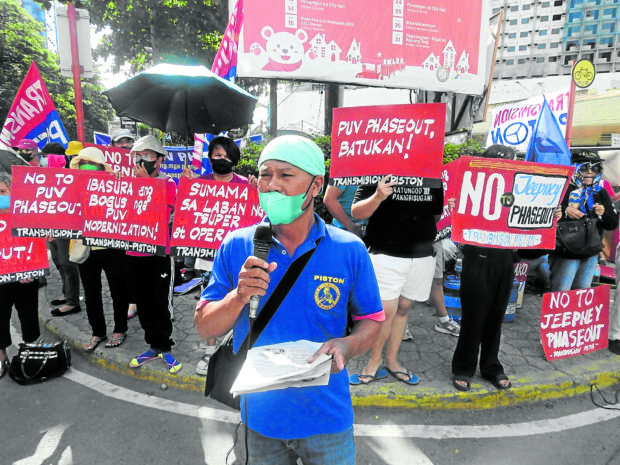Davao drivers’ wish for New Year: No jeepney, PUV phaseout

PLEA Jeepney drivers and operators gather at Freedom Park in Davao City on Wednesday to join calls against the phaseout of traditional jeepneys as this move will impact on their livelihood. —BING GONZALES
DAVAO CITY, Davao del Sur, Philippines — Traffic in some routes in this city almost ground to a halt on Wednesday as local jeepney drivers and operators joined the call protesting the impending phaseout of jeepneys and other public utility vehicles (PUV) in the country next year.
Larry Argilles, a spokesperson for the transport group Transmission, said the protest, which started at 5 a.m. and ended at 3 p.m., paralyzed 70 percent of traffic in the city’s southbound routes that included Panacan, Tibungco, and Bunawan, and as much as 80 percent in the northbound routes, or jeepneys going to Mintal and Calinan.
But while 90 percent of drivers plying the Maa route joined the transport strike, only 60 percent of those plying the circular routes in the city stopped running. The number of those who joined the strike, however, still indicated their objection to the jeepney phaseout, according to Argilles.
He said the protest was in reaction to President Marcos’ order giving jeepney drivers and operators up to only Dec. 31 to consolidate into a cooperative or corporation or else they would lose their right to operate.
Under the government’s Public Utility Vehicle Modernization Program, the PUVs that have not consolidated by the Dec. 31 deadline shall have their provisional authorities deemed revoked by Jan. 1, 2024.
According to Argilles, consolidation is not even an option among jeepney drivers and operators in Davao, where the high-speed bus system about to be implemented in the city next year would allow only big bus companies to come in and would be beyond the financial capacity of small operators.
“The government claimed that the [high-speed] bus would improve the mode of transportation because it would be more comfortable, clean and eco-friendly. But it would not solve the crisis being felt by people in the city,” Argilles said in Cebuano.
“In fact, it will increase the prevailing fare rate in the city. Right now, even our minimum fare of P13 is already too much for ordinary workers, whose daily minimum wage cannot cope with the rising costs of basic commodities. Once the bus system is implemented, expect the fare to double,” he said.
Unemployment
In Davao City, where 6,000 jeepneys are still actively running, the impending phaseout will affect at least 14,000 drivers and their families, Argilles said.
“Once they become jobless, they will increase the number of the unemployed [in the city],” he added.
He said that the impending jeepney phaseout will not only affect drivers, operators, and commuters but also small business enterprises that depend on jeepneys for a living, like owners of stores selling spare parts and shops doing jeepney bodywork, among others.
“I don’t understand why the government prefers to import buses, kill our local industry and deprive Filipino small enterprises of their means to earn a living,” he said.
While imported buses would cost about P2 million per unit, the iconic Sarao jeepney, for instance, if modernized to the comfort of passengers, would only cost less than P1 million per unit, he noted.
Argilles said the protest action on Wednesday would only be the first of the series they would stage to oppose the impending phaseout of jeepneys and other PUVs.
According to Transmission, the only wish among jeepney drivers and operators for Christmas and the New Year is to still keep their livelihood next year.